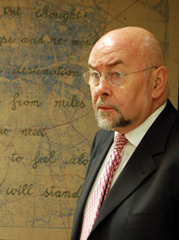Education overhaul
 Reform will be carried out within the terms of the Croke Park Agreement and the 2011 Budget allocation will remain intact. eolas reports.
Reform will be carried out within the terms of the Croke Park Agreement and the 2011 Budget allocation will remain intact. eolas reports.
Without making any permanent teachers redundant or reducing their pay, Education Minister Ruairí Quinn proposes to “seek efficiencies in work and school practices” and ultimately to “position Ireland in the top ten performing countries in the OECD Programme for International Student Assessment [PISA].”
Ireland’s ranking of 26th out of 39 countries for mathematics in the 2009 PISA was a “wake-up call for Irish education”, according to Quinn who has said that we have been “codding ourselves” in thinking that Ireland has one of the best education systems in the world.
In line with the Croke Park Agreement, teachers with permanent posts must be redeployed if necessary and this process has already begun. However the 2,000 newly qualified teachers due to graduate in May are unlikely to get a teaching job.
Quinn told the annual Irish National Teachers’ Organisation (INTO) conference that targets agreed with the EU and IMF in relation to a reduction in the number of public servants must be met if the fortnightly allocation to the Central Bank is to be authorised.
“The reality is that we can no longer afford to leave a teacher surplus in one school while filling permanent or temporary vacancies in other schools by recruitment,” Quinn told delegates.
He told RTÉ’s Morning Ireland on 26 April that “if it’s a choice between a permanent school teacher who’s not prepared to be redeployed to consider [their] options and that of a young [newly qualified] teacher, then I will ensure that space is created for those young teachers.”
He has also indicated that the cap on special needs assistants at 10,575 will remain and that the Budget allocation of €8.25 billion will not be reduced.
All departments are preparing to carry out a public expenditure review and while Quinn says “it won’t be slash and burn, nothing will be off that table.”
Since taking up office, the Minister has questioned the amount of time spent on religious instruction and preparation for the sacraments in schools. He has also introduced the Forum on Patronage and Pluralism. This consists of an independent advisory group that will assess the views of parents, patrons, teachers and the wider community on the need for new forms of multi-denominational, non- denominational and Irish language schooling. It will report to the Minister in the autumn.
The Leaving and Junior Cert exams are “no longer fit for purpose”, according to the Minister.
“We have a very creative and exploratory system at primary level [but] children move to a system like a chicane, where they are measured on what it is they can remember rather than what it is they know,” he said. Quinn hopes that this change can be implemented by September 2012 and that science becomes a compulsory Junior Cert subject by 2014.
The Minister recently announced that the student grant system that has been operated by the 66 vocational education committees (VECs) and local authority grant awarding bodies since 1968, is to be replaced by a single grant awarding authority, the City of Dublin VEC, at the beginning of the 2012-2013 academic year. In addition, VECs will have to come up with their own proposals on where expenditure cuts can be made.
Overall, Quinn’s reforming zeal has been recognised as necessary by the unions. Pat King, General Secretary of the Association of Secondary Teachers Ireland, said the union is “very concerned about the decline in standards [but] when it comes to educational reform we are up for it, provided the necessary support structures and funding is in place.”
Teachers’ Union of Ireland President Peter McMenamin has said that the redeployment of teachers must not equate to further cut-backs in resources.
At its annual congress, INTO launched a task force on teacher employment which will examine how schools can efficiently allocate “thousands of substitute days” to qualified teachers rather than to retired teachers or people with no teaching qualifications.
INTO President Jim Higgins said that the education sector is “fully aware of the scale of the economic challenges facing the country [but] cannot accept that there is nothing we can do but submit to the diktats of the finance department.”





